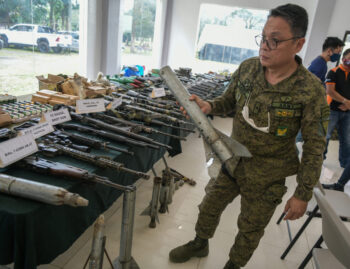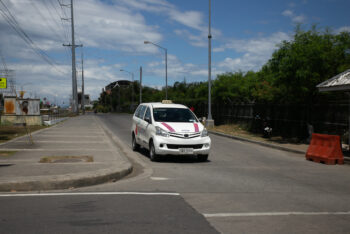
DAVAO CITY (MindaNews / 02 April) – I had just gotten back from my parents’ joint inurnment in Iloilo when I received the news of Fr. Rene Ocampo’s passing. In that moment, the love I felt for Fr. Rene, my other tatay (father), washed over me. Unbidden, Alfred Lord Tennyson’s Crossing the Bar came to mind. I felt the finality of him leaving, and I found that I accepted it. He’s met his Pilot face to face. I felt relief that he had been released from the pain of every day.
I realize that I must be getting on in years when the ones I love start to leave. Also, when I can remember the lines of a poem from childhood better than what I had for brunch.
Now, that’s a thought that Fr. Rene would have quietly smiled at.
In my early years at the Ateneo de Davao University, I never fraternized with the Jesuits. They were my employers after all. But because I too loved to walk, I often saw Fr. Rene out there ambulating around the campus at a sedate pace. We waved at each other in passing until one day he stopped me by quietly pronouncing: “Gail Ilagan. Wayward and Fanciful.”
He said he’d read my column. He asked me a question about the war evacuees I wrote about. We fell in step as our quiet conversation deepened. I told him about the children I talked to in the evacuation centers. He told me about his own experience during the Fall of Manila when as a 10-year-old he had to walk for miles to safety.
My parents, too, had been 10 years old when this country was dragged into World War II. They told us stories about hiding from the Japanese or watching the government houses burn. Listening to them relive their childhood traumas was enough to forever make us say no to war. The late Dr. Nenita Cabalfin, my sociology professor at UP Visayas who went to school in CPU (Central Philippine University) at the same time as my parents did, marked time in terms of “before the War” and “after the War”. So yes, I sort of knew a bit about what it was to be a war time 10-year-old.
The short walks with Fr. Rene turned into longer walks. Liane, my eldest daughter, used to say she saw me out walking with the floating priest. With his soutane on and some stiffness in the leg, Fr. Rene did look like he was gliding through the walkways around the green.
He was always interested to know what I had been up to, where I’d been, and what I saw out there. What did I think about it? In his own quiet way, he was helping me come to terms, find meaning, and grow with my experiences. Always unobtrusive and never challenging, he drew from me some of my insights into the wars and disasters that I would never have allowed myself to voice. Sometimes, I would borrow a line from a poem as a metaphor for my thoughts. He would smile at that.
Later, receiving me for coffee upstairs at the Jesuit Residence became a regular thing. Sometimes, he would also invite me for a meal with the Jesuits. He would introduce me as his friend. I don’t know what Fr. Rene got from talking to me, but he always seemed to be delighted to see and feed me.
Every time I had a schedule to present at a conference, I would go seek his blessings before flying out. Sometimes, he would send me out with money to buy me breakfast – USD10 for Honolulu, Eur4 for Prague and Eur5 for Istanbul, AusD12 for Canberra. Small bills in a used envelope. He said these were from the mass offerings which the Campus Ministry cannot deposit.
RR once joked that Fr. Rene must have a kaban ng yaman under his bed filled with small bills in various currencies. I guess better under the bed than inside a laundry machine. How would that look if a priest got caught with a cache of cash awash in the washer?
He would be the first person I would visit when I got back. He would ask me if I had taken my walking boots on this travel. This was a grey felt pair that I had resoled over and over because they were easy on my feet as I explored unfamiliar cities. We had a lot of funny exchanges that began with where those boots left their prints this time around.
One time, he asked me to write about my walking boots for an alumni e-newsletter. I think that perhaps that was the only uncomfortable moment I had with him. I was this atik columnist who had no fear, but I am shaking in my boots over the prospect of this well-spoken priest’s edits!
Fr. Rene was a child of war. Conservation and making do are ingrained habits of children of war. I did understand his fascination for the constantly resoled walking boots. He was more interested in the fate of my boots than in the latest batch of bad pictures I invariably took.
When I knew him, Fr. Rene was never one to tiptoe around the topic of death. With his knees feeling his age, it was hard for him to take the stairs to and from his quarters on the 10th floor. Once when they knocked on his door during an earthquake, the prospect of the walk down 10 flights had him wearily replying, “I’d rather die.”
During our conversations, he often talked about visiting the sick, giving Extreme Unction, comforting the bereaved, or saying funeral mass. Unfailingly, he would connect the dead and dying to the living: Who was related how; who the departed went to school with; who they left behind, where they are, and what they are doing.
When he was running the Alumni Office at ADDU, we joked that the only emails we got from his office came in the form of obituaries.
I remember, too, that he preferred to die on a Good Friday. Remarking on how God seemed to have granted him his wish, my daughter Sage said, “Kairos, ma.” In God’s time.
He was the kindest man. Every time I counseled my students to remember to be kind, it was his constant example that I had in mind.
Fr. Rene will always be in my heart. I will honor him by never throwing out my boots.
(Gail Ilagan is the former chair of the Department of Psychology at the Ateneo de Davao University. Readers can reach her at gail@mindanews.com.)







